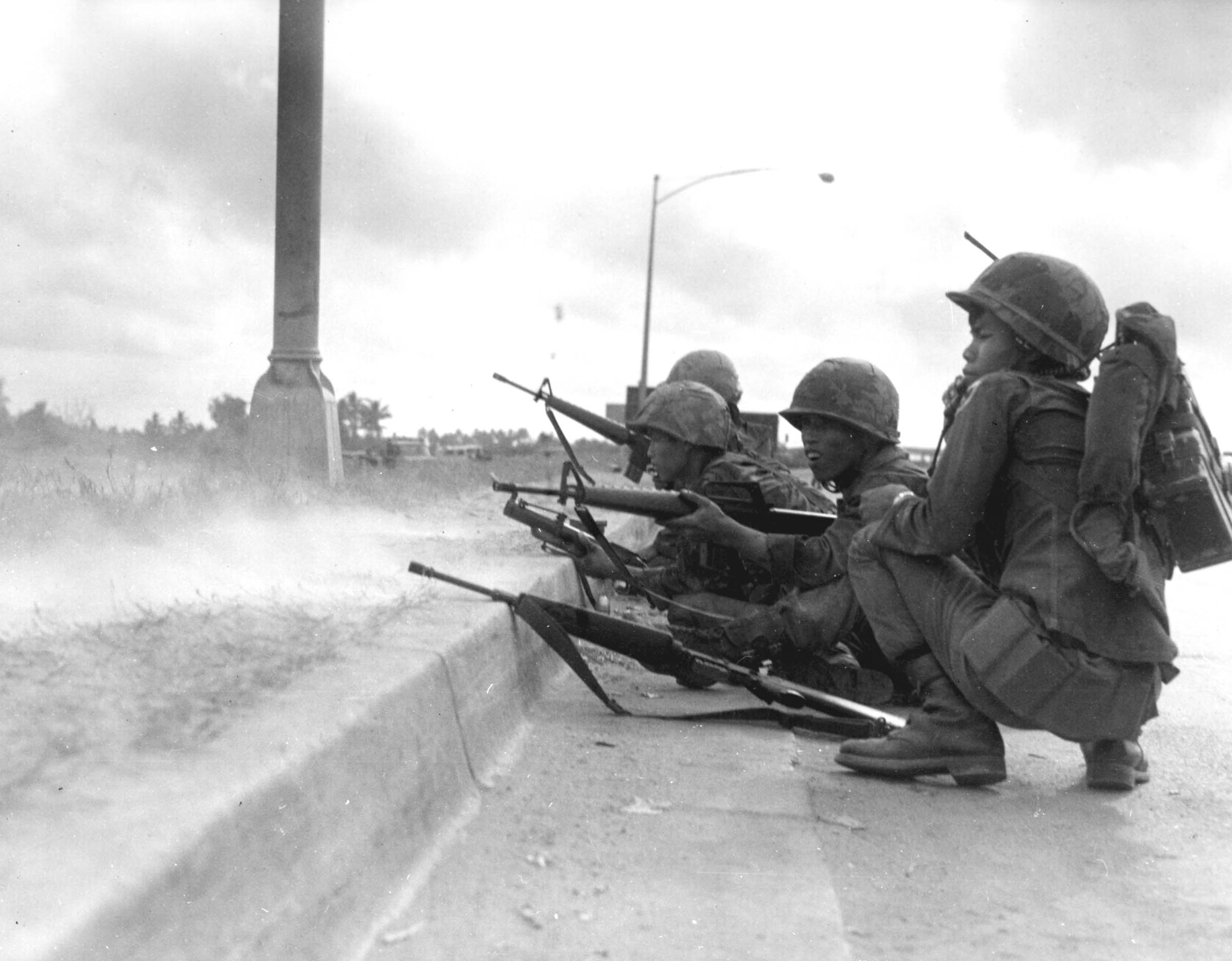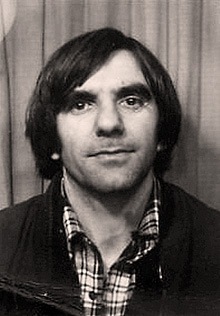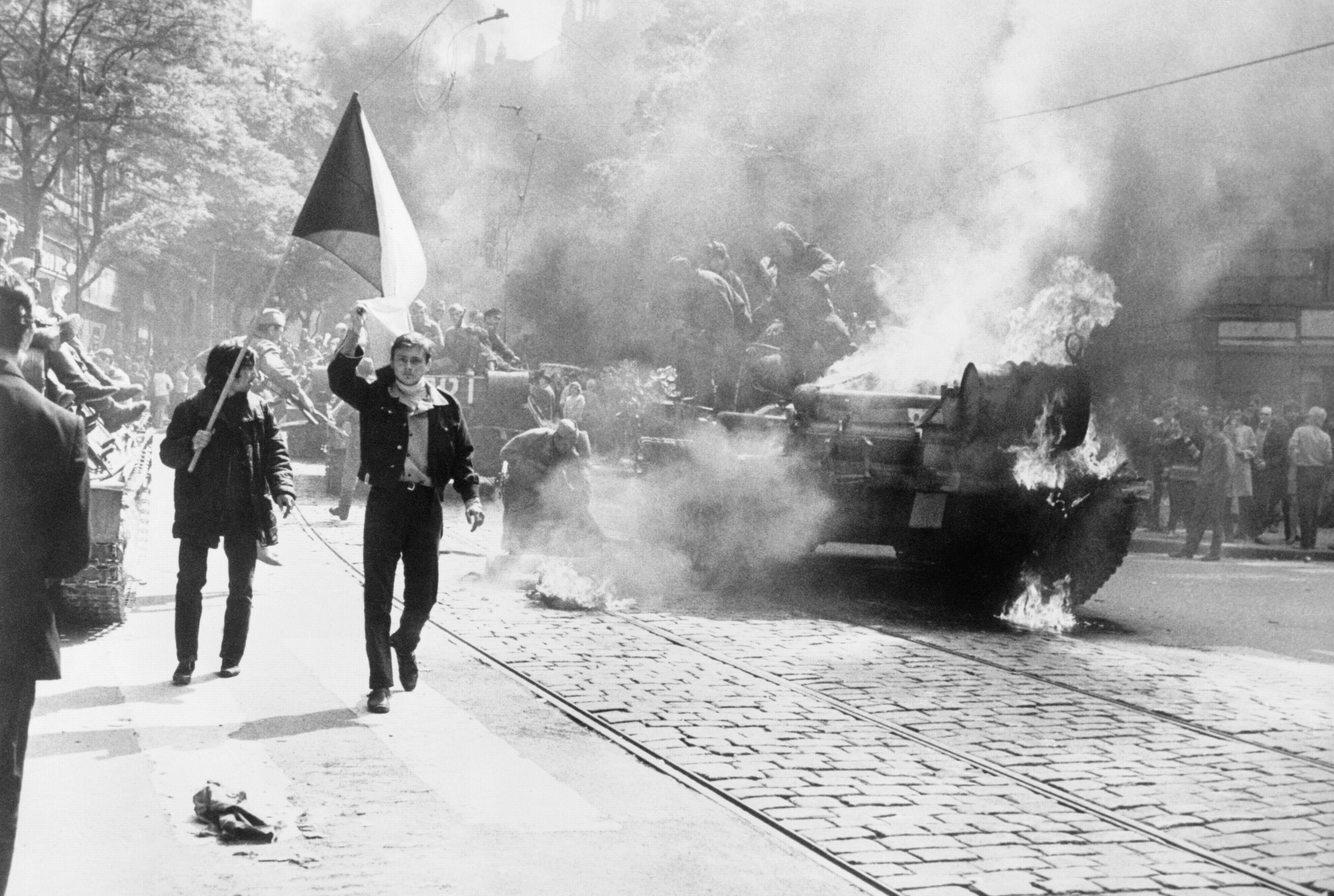1968 Tet Offensive, Assassination Attempt on Rudi Dutschke and Prague Spring
"So it remains that what is being processed in Frankfurt is a matter that can not be recommended for imitation - aside from the tremendous threat to the perpetrators, because of the threat of severe punishment. But what Fritz Teufel said at the delegates conference of the SDS remains: "It's still better to set fire to a department store than to run a department store.""
The arsonists were convicted to jail. Yet despite this Baader, Ensslin and Meinhof would only a few years later become the founding members of the leftist terrorist group RAF.
Only a few days after the arson another incident occured that further escalated the conflict between the state and the student protest movement. In April 11 a young worker named Josef Bachmann approached the important political activist Rudi Dutschke, drew a gun and fired three shots on him. Two hit his head, one hit his shoulder. Dutschke barely survived but had lasting health problems.
Dutschke was one of the most important figures of the student protest movement. He was a prominent person who was frequently attacked by the conservative and right press, especially the Springer publishing company. Bachmann, who was a right-wing extremist, had been influenced by this and attacked Dutschke out of hatred for communists.
The Western German student movement was shocked by this attack. The recent, violent death of Ohnesorg was still fresh in the memory. Now a prominent leader of them barely escaped a politically motivated assassination attempt. Many students blamed the "Bild"-newspaper by the Springer publishing company who had attacked Dutschke for years. The "Bild" had called upon their readers to "stop Dutschke" even "without the police".
The assassination attempt on Dutschke moved people throughout the country. Violent protests broke out not just in West Berlin but in other Western German cities as well. Two people died during the protests.
In the following time Dutschke's health was too poor to participate and lead other protests. The student protest movement lost one of their most important figures. The year 1968 had been the peak of the student protests, in the following years other groups came up who party followed different goals.
During 1968 another major event occured that influenced young, left students around the world. In Czechoslovakia a reform movement tried to change the current conditions that were seen as oppressive. This was called "Prague Spring". The world attentively observed this moment. The reformists were trying to create a "socialism with a human face" that was neither like the current model of the East nor like the one of the West, it was supposed to be a middle course with more freedom and indepency for every individual.
Many people in Western countries, especially left-leaning ones, were looking with hope at the events in Czechoslovakia. But the leadership of the Soviet Union was looking with mistrust on the occuring changes. Since the death of Josef Stalin there had been some relaxations in Soviet politics which made life easier for many people in the USSR. But the Soviet leadership was highly skeptical of reformist movements like the one in Czechoslovakia because they feared additional indepency of Eastern European states would ultimately lead in a loss of Soviet satellite states. After WWII the Red Army had seized many Eastern European states who were actually longing for indepency after years of cruel Nazi reign. There had been a number of violent protests in the time after WWII in many Eastern European countries, including Eastern Germany, that had been struck down with force.
Eventually negotiations between the reformists and the Soviet leadership failed. The Soviets chose a way of force and sent 500,000 troops of the Warsaw Pact who invaded Czechoslovakia and occupied the country. More than 200 people died in the fights. Czechoslovakia's dream for freedom had ended.
Many Western leftists became disillusioned with Soviet views. They turned away from the Soviet Union and chose to find their own way instead.
1968 had been a turbulent year where some developments escalated, others were ending and new ones were starting. The protests and changes brought by the student protest movement had a vast and lasting influence on the Western German society, both politically and culturally.
The events of 1967 agitated and enlarged the Western German student movement. During 1968 there would be an increase and ultimately a peak of the student movement.
It's important to see both the state Western Germany and the rest of the world was in during this year. The Vietnam War intensified. During the "Tet Offensive" the North Vietnamese forces surprised American troops with a large scale attack.
The escalation of the Vietnam War was not without consequences for the rest of the world. In April 2 1968 a group of four people, two of them being Andreas Baader and Gudrun Ensslin, left incendiary bombs in multiple department stores. The bombs had a timer that would explode at midnight. No people were harmed in the explosions but some damage was caused.
The death of Benno Ohnesorg had radicalized parts of the student protest movement. There were people who argued that violence against objects was a legitimate form of protest. Other people criticized the "indifference" within the Western societies towards the suffering of the Vietnamese people. The allegedly excessive capitalism and consumerism was another point of criticism.
The police quickly captured the perpetrators behind this act. The court case became a stage for the politically motivated arsonists who were acting cheerishly and smoking cigars.
During the protest one young journalist sympathized with the culprits. It was Ulrike Meinhof who wrote:
It's important to see both the state Western Germany and the rest of the world was in during this year. The Vietnam War intensified. During the "Tet Offensive" the North Vietnamese forces surprised American troops with a large scale attack.
ARVN Rangers defend Saigon during the Tet Offensive
US military personnel, ARVN Rangers defend Saigon, Tet Offensive, marked as public domain, more details on Wikimedia Commons
It ended in a severe military defeat for North Vietnam and the Vietcong yet nevertheless it became a propaganda victory for them. The North Vietnam forces had shown that they were still dangerous and the war was not won yet. The violence of this war appalled many people around the world and many people in Western countries questioned the meaning of the Vietnam War or even outright supported the Northern communist forces.The escalation of the Vietnam War was not without consequences for the rest of the world. In April 2 1968 a group of four people, two of them being Andreas Baader and Gudrun Ensslin, left incendiary bombs in multiple department stores. The bombs had a timer that would explode at midnight. No people were harmed in the explosions but some damage was caused.
The death of Benno Ohnesorg had radicalized parts of the student protest movement. There were people who argued that violence against objects was a legitimate form of protest. Other people criticized the "indifference" within the Western societies towards the suffering of the Vietnamese people. The allegedly excessive capitalism and consumerism was another point of criticism.
The police quickly captured the perpetrators behind this act. The court case became a stage for the politically motivated arsonists who were acting cheerishly and smoking cigars.
During the protest one young journalist sympathized with the culprits. It was Ulrike Meinhof who wrote:
"So it remains that what is being processed in Frankfurt is a matter that can not be recommended for imitation - aside from the tremendous threat to the perpetrators, because of the threat of severe punishment. But what Fritz Teufel said at the delegates conference of the SDS remains: "It's still better to set fire to a department store than to run a department store.""
The arsonists were convicted to jail. Yet despite this Baader, Ensslin and Meinhof would only a few years later become the founding members of the leftist terrorist group RAF.
Only a few days after the arson another incident occured that further escalated the conflict between the state and the student protest movement. In April 11 a young worker named Josef Bachmann approached the important political activist Rudi Dutschke, drew a gun and fired three shots on him. Two hit his head, one hit his shoulder. Dutschke barely survived but had lasting health problems.
Dutschke was one of the most important figures of the student protest movement. He was a prominent person who was frequently attacked by the conservative and right press, especially the Springer publishing company. Bachmann, who was a right-wing extremist, had been influenced by this and attacked Dutschke out of hatred for communists.
The Western German student movement was shocked by this attack. The recent, violent death of Ohnesorg was still fresh in the memory. Now a prominent leader of them barely escaped a politically motivated assassination attempt. Many students blamed the "Bild"-newspaper by the Springer publishing company who had attacked Dutschke for years. The "Bild" had called upon their readers to "stop Dutschke" even "without the police".
Political activist Rudi Dutschke
photo taken by photo machine, source is my private collection. I am
the wife of Rudi Dutschke who is no longer alive. This one was never
published.. Original uploader was Dodo von den Bergen at de.wikipedia, Rudi-2, marked as public domain, more details on Wikimedia Commons
Protests subsequently broke out in front of the Springer house in West Berlin. Students were throwing rocks at the house and the policemen defending it. One young man named Peter Urbach, who was frequently in the left student scene, appeared and started to hand out Molotov Cocktails. Urbach was actually an informant and agent provocateur of the West Berlin domestic intelligence agency, the Verfassungsschutz. It was his job to further radicalize and escalate the protests so the Western German state could use this as a justification to strike down the student protest movement. But this wasn't publicly known at this time.
The assassination attempt on Dutschke moved people throughout the country. Violent protests broke out not just in West Berlin but in other Western German cities as well. Two people died during the protests.
In the following time Dutschke's health was too poor to participate and lead other protests. The student protest movement lost one of their most important figures. The year 1968 had been the peak of the student protests, in the following years other groups came up who party followed different goals.
During 1968 another major event occured that influenced young, left students around the world. In Czechoslovakia a reform movement tried to change the current conditions that were seen as oppressive. This was called "Prague Spring". The world attentively observed this moment. The reformists were trying to create a "socialism with a human face" that was neither like the current model of the East nor like the one of the West, it was supposed to be a middle course with more freedom and indepency for every individual.
Many people in Western countries, especially left-leaning ones, were looking with hope at the events in Czechoslovakia. But the leadership of the Soviet Union was looking with mistrust on the occuring changes. Since the death of Josef Stalin there had been some relaxations in Soviet politics which made life easier for many people in the USSR. But the Soviet leadership was highly skeptical of reformist movements like the one in Czechoslovakia because they feared additional indepency of Eastern European states would ultimately lead in a loss of Soviet satellite states. After WWII the Red Army had seized many Eastern European states who were actually longing for indepency after years of cruel Nazi reign. There had been a number of violent protests in the time after WWII in many Eastern European countries, including Eastern Germany, that had been struck down with force.
Eventually negotiations between the reformists and the Soviet leadership failed. The Soviets chose a way of force and sent 500,000 troops of the Warsaw Pact who invaded Czechoslovakia and occupied the country. More than 200 people died in the fights. Czechoslovakia's dream for freedom had ended.
Czechoslovaks carry their national flag past a burning Soviet tank in Prague.
The Central Intelligence Agency, 10 Soviet Invasion of Czechoslovakia - Flickr - The Central Intelligence Agency, marked as public domain, more details on Wikimedia Commons
People in the West were appalled by this development. There were many protests and many countries condemned the invasion and the violence. The NATO chose not to intervene because it didn't want to provoke the Warsaw Pact. Many Western leftists became disillusioned with Soviet views. They turned away from the Soviet Union and chose to find their own way instead.
1968 had been a turbulent year where some developments escalated, others were ending and new ones were starting. The protests and changes brought by the student protest movement had a vast and lasting influence on the Western German society, both politically and culturally.



Kommentare
Kommentar veröffentlichen